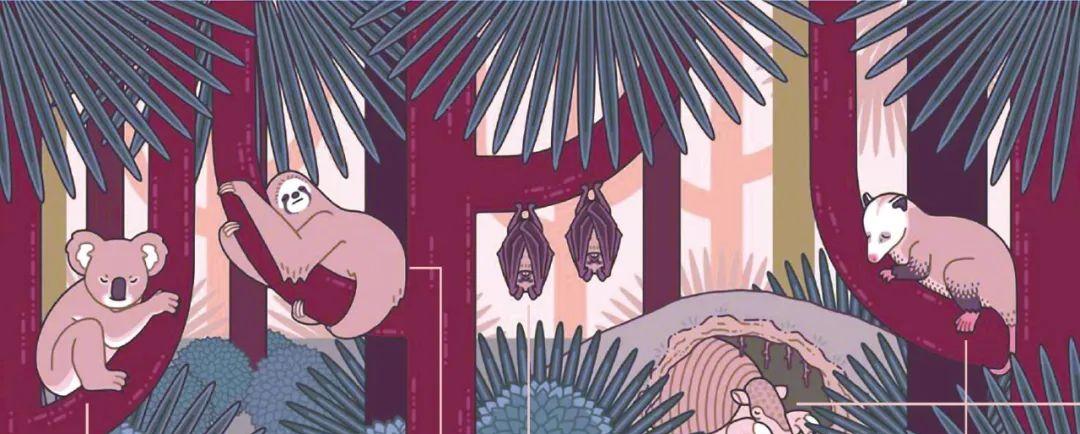The length of time animals sleep varies widely, ranging from 30 minutes of sleep to koalas a day. So, which animals sleep the longest? Let's take a look.
The amount of time noted in this article is the average daily sleep length of the animal.

koala
Sleep duration: about 22 hours
Koalas live in eucalyptus forests in Australia and make a living by eating eucalyptus leaves. Eucalyptus leaves are inedible to most animals, cause poisoning, and contain very few calories, making them highly unsuitable for food, but koalas have cleverly addressed these issues.
Its body secretes a special enzyme that can break down toxins in eucalyptus leaves; at the same time, it uses ultra-long sleep times to reduce energy consumption and balance too little calorie intake. In this way, koalas gain their own unique living space in nature.
sloth
Sleep duration: 15 to 20 hours
Sloths are animals known for their slow movements, living in the canopy of tropical rainforests in Central and South America for most of their lives, and some sloths even hang from branches with their long claws after death. This is their survival strategy to avoid predators, as their hind limbs are weak and move very slowly on the ground.
Sloths are also thought to be a sleepy bug, but there is controversy, with studies showing that while sloths spend most of their time motionless, they don't necessarily sleep, and they are likely to sleep only about 10 hours a day. Motionlessness is the way they blend into the environment, camouflage themselves.
Brown bat
Sleep duration: about 20 hours
The brown bat is one of the most widely distributed terrestrial animals in the world. They only wake up at night for about 4 hours to find food. In addition to this, they may hibernate for half a year to cope with a lack of food.
Tigers, lions and cats
Sleep duration: 16 to 20 hours
Felines love to sleep. Both tigers and lions slept heavily after a big meal, sometimes for 24 hours. Wake up and start the next round of hunting and predation.
After the tiger catches a large prey, it usually eats and sleeps next to the prey, wakes up and continues to eat for several days. Sleeping next to food also prevents other animals from grabbing food.
In lion flocks, female lions are responsible for feeding young lions and spend more time hunting, so they sleep two or three hours less than male lions, while male lions take on the task of guarding territory and groups.
Although domestic cats no longer need to worry about food, they still retain the tradition of their ancestors sleeping, sleeping 18 hours a day.
Big armadillo
Sleep duration: about 19 hours
The armadillo (qiú yú) is a shelled mammal that curls up into a ball when in danger and protects itself with a hard shell. The large armadillo is the largest of the armadillos, reaching more than 1 meter in length, but the tail accounts for half of the length. They love to eat ants and termites, but other insects, carrion, snails, small lizards, etc. are also their food.
Armadillos come out at night, sleeping most of the time in their own caves and coming out at night to forage for food.
North American possum
Sleep duration: 18 to 19 hours
Although the possum looks very different from the armadillo, its habits are very similar, and it is also a nocturnal animal that lives in a cave dug by itself, spends most of its time sleeping, and spends only a short time looking for food.
boa
Sleep duration: about 18 hours
Pythons are the only non-mammals on this list. If you have a pet python, maybe at first you'll find that it never sleeps because its eyes are always wide open. However, pythons not only sleep like humans, but also sleep for a long time, but because snakes have no eyelids, they cannot close their eyes and can only sleep with their eyes open.
Night Monkeys
Sleep duration: about 17 hours
The night monkey is also known as the "owl monkey" because it forages at night like an owl, sleeps during the day, and has a pair of large, round eyes with good night vision.
The stinging of animals, such as hibernation or summer sleep, is very different from sleep, which is a way of reducing energy consumption in extreme climates. During hibernation or summer sleep, the animal's metabolic rate and body temperature decrease, and brain activity decreases significantly. However, some animals sting once a day, such as the American badger.